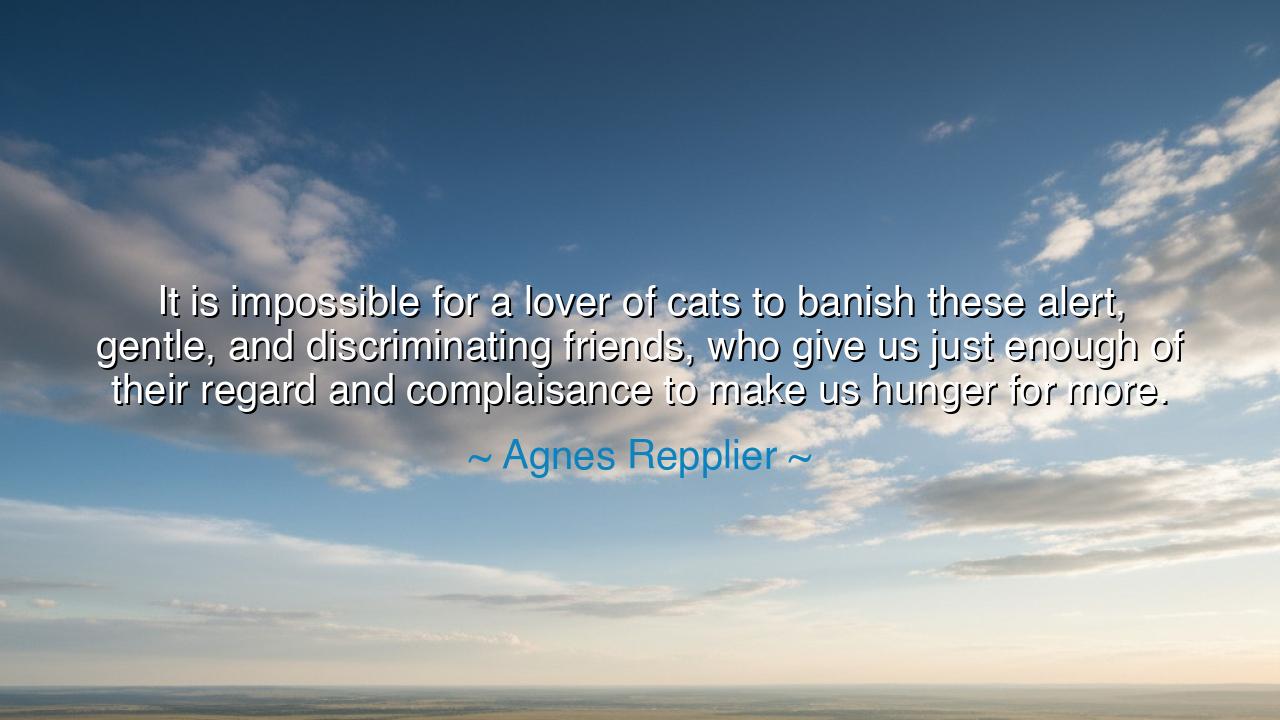
It is impossible for a lover of cats to banish these alert
It is impossible for a lover of cats to banish these alert, gentle, and discriminating friends, who give us just enough of their regard and complaisance to make us hunger for more.






Hear, O lovers of mystery and grace, the words of Agnes Repplier, who declared: “It is impossible for a lover of cats to banish these alert, gentle, and discriminating friends, who give us just enough of their regard and complaisance to make us hunger for more.” This is no casual remark, but the distilled essence of all who have ever lived in the presence of the cat. For unlike the dog, whose affection is boundless and obvious, the cat bestows its regard sparingly, as a monarch might grant a favor. And yet, it is this very scarcity, this delicate measure of affection, that makes its gift so deeply treasured.
The cat, in its wisdom, teaches us that love cannot be demanded, only earned. It offers itself not wholly, but in glimpses— a soft purr, a slow blink, a gentle brush against the hand. And when it withdraws, as it inevitably does, it leaves us yearning for its return. Thus, Repplier names them gentle and discriminating friends, for they are companions who choose us, who weigh our worthiness, and who, by granting only a portion of their affection, bind us all the tighter to them.
This truth has been seen across the centuries. In ancient Egypt, the cat was not merely tolerated but worshipped. Temples were built for Bastet, the goddess with the face of a lioness or a domestic cat, and in her presence men and women bowed. Why? Because they knew what Repplier knew—that the cat’s affection was sacred precisely because it was not guaranteed. To win the gaze of such a creature was to touch something divine, fleeting yet eternal.
Even in the halls of power, cats have left their quiet mark. Cardinal Richelieu, the great statesman of France, kept numerous cats in his chambers. It was said that, amid the intrigues of politics, he found solace not in the chatter of courtiers, but in the silent companionship of his feline friends. Their regard was selective, impartial, and honest, and thus he cherished it. He too was made to hunger for more, receiving just enough of their affection to sustain him through the storms of statecraft.
The deeper meaning of Repplier’s words is this: love that is freely chosen is the sweetest of all. The cat does not flatter, nor does it feign affection for gain. Its friendship is alert, gentle, and discriminating—alert in its watchfulness, gentle in its presence, and discriminating in its choice of whom to trust. In this, the cat reflects the nature of true love among humans as well: it cannot be forced, but when freely given, it nourishes the soul beyond measure.
The lesson, then, is to value what is rare and authentic. Do not scorn love that is not constant, for its ebb and flow is part of its beauty. Do not demand affection as a right, but receive it as a gift. And when given, even in small measure, cherish it deeply. For just as the cat binds us through its quiet reserve, so too do people bind us through the delicate balance of closeness and distance, presence and absence.
Practically, this means cultivating patience and humility in our relationships. Like the cat lover in Repplier’s vision, we must learn to appreciate the glimpses of affection without demanding more. We must respect boundaries, cherish authenticity, and rejoice in the small gestures that reveal true connection. To love, whether man or beast, is not to possess, but to honor.
So, O listeners, remember Agnes Repplier’s truth: the cat cannot be banished, for its rare and discriminating love enslaves us by delight. And let this be your guide in all matters of the heart—seek not abundance without authenticity, but treasure the quiet, genuine bonds that leave you hungering not out of emptiness, but out of wonder. For in such measured affection lies the deepest beauty, the kind that does not fade.
––






AAdministratorAdministrator
Welcome, honored guests. Please leave a comment, we will respond soon